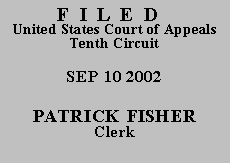

| MICHAEL W. RISNER, |
|
Mr. Risner was convicted in state court of manufacturing methamphetamine (count I), maintaining a residence for keeping or selling drugs (count II), unlawful possession of methamphetamine without a tax stamp affixed (count III), reckless conduct with a firearm (count IV), and possession of a firearm during the commission of a felony (count V). Mr. Risner was sentenced to twenty years imprisonment and a $50,000 fine for count I, two years imprisonment and a $1,000 fine for count II, four years imprisonment for count III, six months in the county jail and a $500 fine for count IV, and two years imprisonment for count V, to be served consecutively, except for count IV, to run concurrently with the other counts. On direct appeal, the Oklahoma Court of Criminal Appeals ("OCCA") affirmed the convictions and sentences. Mr. Risner subsequently filed an application for post-conviction relief in the district court, which was denied. The OCCA affirmed the district court's denial of post-conviction relief.
Mr. Risner then filed a federal habeas petition, claiming that (1) the affidavit for the search warrant contained false statements, and therefore, under Franks v. Delaware, 442 U.S. 928 (1979), the trial court erred in failing to suppress the evidence at trial; (2) trial counsel was ineffective in failing to raise the Franks issue; (3) the evidence seized should have been suppressed because no probable cause existed to support the search warrant; (4) he was not given a full and fair opportunity to litigate his Fourth Amendment claim in state court; (5) his appellate counsel was ineffective; (6) he did not receive a fair trial because the prosecution concealed evidence of a deal with a key witness; (7) his convictions could not be sustained due to insufficient evidence; (8) the OCCA's decision denying his claim of ineffective assistance of trial and appellate counsel is contrary to or an unreasonable application of federal law; (9) his due process rights were violated because his trial counsel had a conflict of interest; and (10) the OCCA's summary opinion denying his claims of error was contrary to relevant case law.
After referral of the matter from the district court, the magistrate judge issued a thorough report and recommendation. In addition to fully addressing and disposing of Mr. Risner's claims relating to ineffective assistance of trial and appellate counsel and sufficiency of evidence, the magistrate judge included a discussion of the merits of Mr. Risner's Franks claim and recommended denial of the petition. The district court adopted the report and recommendation and denied Mr. Risner's petition. Mr. Risner filed a motion to reconsider, which was denied by the district court.
With the exception of issue (3), Mr. Risner raises substantially the same issues he raised in the district court. He has also raised on appeal claims that the district court erred in mooting his pro se objections to the report and recommendation of the magistrate judge, thus denying his constitutional right to self-representation.
The district court correctly noted that Mr. Risner is not entitled to proceed pro se at the same time as he was represented by counsel. "[P]arties may...conduct their own cases personally or by counsel." 28 U.S.C. § 1654 (emphasis added). Even if § 1654 were not a bar, the right to proceed pro se is not unqualified. See United States v. Dinitz, 538 F.2d 1214, 1219 (5th Cir. 1976) ("[T]he Sixth Amendment's right to choice of counsel merely informs judicial discretionit does not displace it."). Because counsel for Mr. Risner already filed objections to the report and recommendation, there was no abuse of discretion when Mr. Risner was not permitted to file his pro se objections to the report and recommendation.
We have carefully reviewed Mr. Risner's request for a COA, his appellate brief, the magistrate judge's recommendation, and the appellate record, and conclude that Mr. Risner has failed to demonstrate that the issues raised are debatable among jurists, that a court could resolve the issues differently, or that the questions presented deserve further proceedings. See Slack v. McDaniel, 529 U.S. 473, 483-84 (2000). We only add to the district court's analysis the fact that in Aycox v. Lytle, 196 F.3d 1174 (10th Cir. 1999), we held that state court summary opinions are owed the same deference as those that fully discuss the merits. Id. at 117778. As such, Mr. Risner has failed to make the "substantial showing of the denial of a constitutional right" required for a COA. 28 U.S.C. § 2253(c)(2).
Accordingly, for substantially the same reasons set forth by the magistrate judge, we DENY Mr. Risner's request for a COA, we DENY IFP, we DENY his request for appointment of counsel, and we DISMISS his appeal.
Entered for the Court
Paul J. Kelly, Jr.
Circuit Judge
*. This order and judgment is not binding precedent, except under the doctrines of law of the case, res judicata, and collateral estoppel. This court generally disfavors the citation of orders and judgments; nevertheless, an order and judgment may be cited under the terms and conditions of 10th Cir. R. 36.3.
2. After examining the briefs and the appellate record, this three-judge panel has determined unanimously that oral argument would not be of material assistance in the determination of this appeal. See Fed. R. App. P. 34(a)(2); 10th Cir. R. 34.1(G). The case is therefore ordered submitted without oral argument.